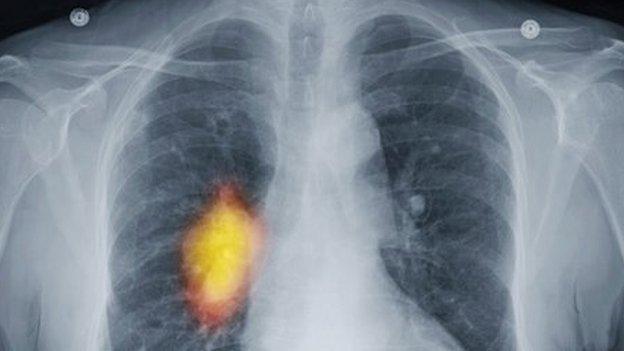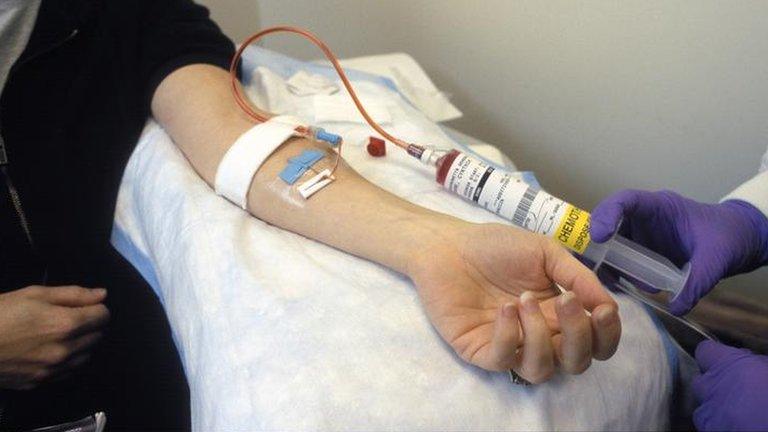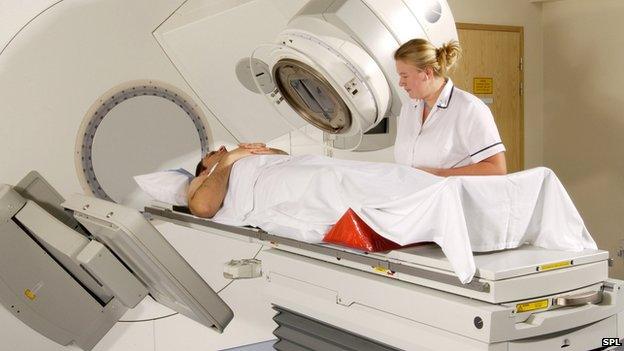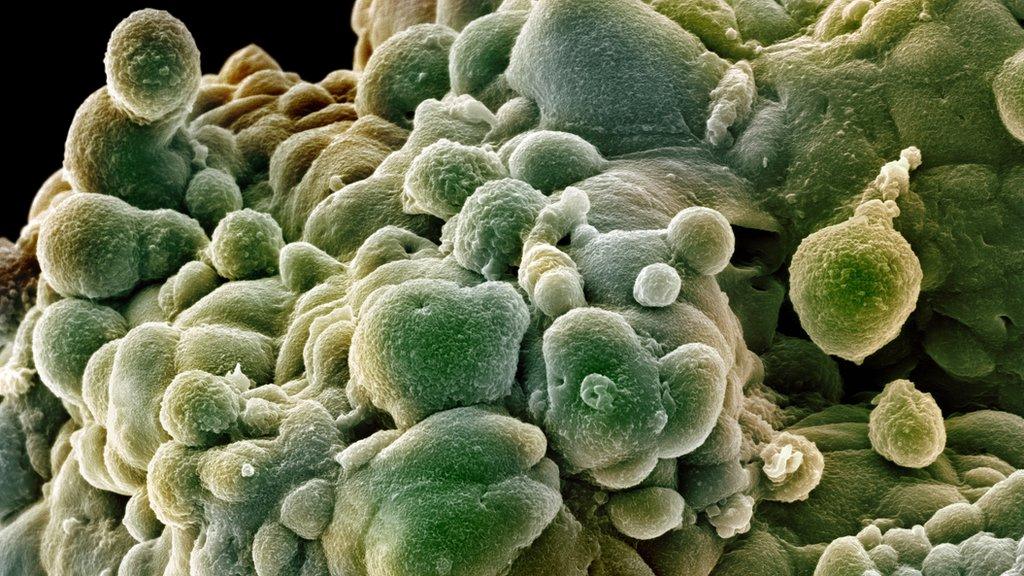Cancer diagnosis 'within four weeks' under new care plan
- Published

A chest X-ray showing cancer in the right lung
NHS patients in England should get results for cancer tests within four weeks of being referred by a GP by 2020 under new plans to improve treatment.
NHS England's cancer taskforce is also replacing old radiotherapy machines and increasing specialist staff to ensure it delivers "world class" cancer care.
The five-year plan will cost £400m a year but experts say earlier treatment will result in similar savings.
They say the plan could help an extra 30,000 patients survive for 10 years.
While survival rates have been improving, England still lags behind some of the best performing countries.

Want to know more?
Go to our special report page on cancer for more information about the disease and what is being done to tackle it.

Harpal Kumar, chief executive of Cancer Research UK and chairman of NHS England's task force, said the changes could help create a "world class" service over the coming years.
"We have an opportunity to save many thousands of lives from cancer."
Saving lives
Currently 280,000 people in England are diagnosed with cancer each year - with half surviving for at least 10 years.
Harpal Kaur, NHS England task force: "It would be unacceptable not to achieve the improvements we are setting out"
But Mr Kumar believes another 30,000 people a year could end up surviving that long once the changes have been put in place - a third of them simply through diagnosing the disease earlier.
The plans include:
The creation of a four-week target for diagnosis from GP referral. Currently patients are meant to see a specialist within two weeks of a GP referral but can then face weeks of waiting for tests, meaning a growing number of patients do not get their treatment started within 62 days as they should
An 80% increase in the number of tests being carried out, including increasing the ability of GPs to order tests directly - for many they have to go through a hospital specialist
Replacing more than 100 radiotherapy machines - half of England's stock - with new, better models
Recruiting extra staff in areas such as specialist nurses and radiologists, with the latter needing to nearly double in number
Cancer patients to get online access to all their test results and a specialist nurse or other key worker to co-ordinate their care
A call for action on smoking and obesity - four in 10 cancers could be prevented through lifestyle improvements
All cancer survivors to be given a recovery package so they get the support they need to recover from their treatment and stay cancer-free
The NHS screening programme catches cancer early
The publication of the five-year strategy comes after a cross-party group of MPs warned that cancer services had "lost momentum" in the past two years.
The health service has been struggling to meet waiting times and seen resources reduced, the Public Accounts Committee warned.
The improvements will cost £400m a year, but the taskforce believes that in the long term, this will be recouped as better care costs less money.
For example, bowel cancer caught at a late stage costs four times as much to treat as when it is caught early.
Cancer in England
280,000
people diagnosed last year
-
2 million cancer survivors are currently alive
-
But 130,000 people die each year from cancer
-
4 weeks target for cancer diagnosis by 2020
NHS England chief executive Simon Stevens said the plans would be "embraced" - and said any upfront costs could be covered by the extra money being given to the health service.
"The good news is that survival rates are at their highest ever, but two-fifths of cancers are preventable and half of patients are currently diagnosed when their cancers are advanced.
"That's why the NHS will be backing this groundbreaking route map for prevention, earlier diagnosis, modern treatments and compassionate care."
Dr Maureen Baker, of the Royal College of GPs, welcomed the plans.
But she warned: "The system is already overloaded and we must ensure that there is sufficient imaging and specialist capacity to cope with the increased number of referrals before promises are made to patients that cannot be delivered."
Lynda Thomas, chief executive at Macmillan Cancer Support, described the plans as "ambitious".
"This report has to be more than a set of recommendations on paper. It has to inspire action and lead to meaningful improvements for the lives of people with cancer," she added.
- Published18 July 2015
- Published11 March 2015

- Published18 February 2015

- Published6 January 2015

- Published30 October 2014
